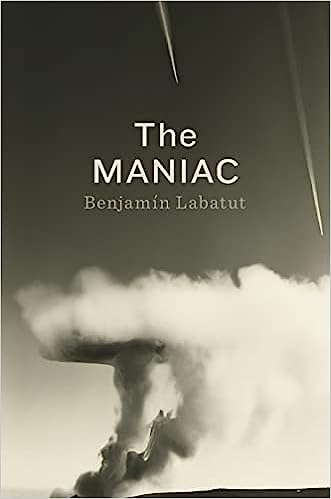ghose 📚 reviewed MANIAC by Benjamín Labatut
copio/pego desde o blog
4 stars
A partir de biografías, citas atribuídas e documentación histórica, o autor tece un relato cos personaxes que na primeira metade do século XX estableceron as bases teóricas das matemáticas e a física (de partículas) que propiciaron os avances tecnolóxicos da segunda metade do século.
O relato susténtase nos testemuños narrados en primeira persoa (excepto o protagonista principal), como se estivesemos vendo un documental onde os protagonistas contan a cámara a súa versión, sen ter un narrador que nos guíe. Falan dun xeito directo e cru, case como se sentisen alivio por poder falar finalmente, como sendo conscientes que todos os pecados prescribiron.
Uns falan dos outros e sobre si mesmos fiando unha historia de influencias positivas, que alimentan o talento de outras persoas co seu propio, e tamén negativas, con relacións tóxicas, de dominación, de abuso, traicións, etc. Así, a figura central da …
A partir de biografías, citas atribuídas e documentación histórica, o autor tece un relato cos personaxes que na primeira metade do século XX estableceron as bases teóricas das matemáticas e a física (de partículas) que propiciaron os avances tecnolóxicos da segunda metade do século.
O relato susténtase nos testemuños narrados en primeira persoa (excepto o protagonista principal), como se estivesemos vendo un documental onde os protagonistas contan a cámara a súa versión, sen ter un narrador que nos guíe. Falan dun xeito directo e cru, case como se sentisen alivio por poder falar finalmente, como sendo conscientes que todos os pecados prescribiron.
Uns falan dos outros e sobre si mesmos fiando unha historia de influencias positivas, que alimentan o talento de outras persoas co seu propio, e tamén negativas, con relacións tóxicas, de dominación, de abuso, traicións, etc. Así, a figura central da novela é John von Neumann, respetada e admirada por todas esas mentes privilexiadas, pero cunha personalidade conflitiva. Non só fixo aportacións teóricas fundamentais, se non que materializou no mundo real eses fundamentos teóricos. Máquinas que pensan
Algunha das súas concrecións foi terrible xa no seu momento e na novela lemos citas dos protagonistas sobre os dilemas éticos que suscitaba entre a comunidade científica, onde Neumann parecía non sufrir en absoluto ese debate interno.
Na segunda parte da novela temos unha crónica periodística marabillosa. Defínoa así, pero é un relato moi ben escrito sobre o que implica que unha máquina pense, o que sentimos os humanos cando unha máquina pensa mellor que un cerebro humano.
Esa experiencia téñena (tivérona) os grandes mestres do xadrez e do go, que se enfrontaron a máquinas cada vez máis «pensantes», non só con maior capacidade de cálculo, se non que tomaban decisións propias, «creativas», adaptándose. Máquinas descritas por persoas como Turing, Neumann e os seus contemporáneos.
Toda a novela é fascinante, pola intensidade e forza que teñen as protagonistas, pero a última crónica xunta nun relato o compendio do que Neumann foi quen de ver cincuenta anos antes e para o que estableceu a arquitectura que aínda se usa nas computadoras actuais a partir da súa formulación teórica. É a personalidade dos personaxes quen dota de forza á novela e te engancha.
Lectura totalmente recomendable¹.
Podes escoitar ou ler a Labatut nunha entrevista na NPR
¹ dispoñible en galiciale.gal (ebiblio.es)




